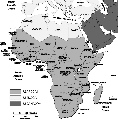Africa is on the verge of yet another major war. For the past four months, Somalia has been battered by an internal conflict between an Islamic movement and a secular government. In recent weeks, troops from neighboring Ethiopia and Eritrea have entered the country. Thousands of refugees have been fleeing across the Somali-Kenyan border, threatening to overwhelm the Kenyan government. The escalating war in Somalia, coming on top of the conflicts in Sudan and the Congo, underscores the need for the United States to develop an improved means for managing African security issues. For many years, American strategists have argued that the continent's vulnerability to terrorism and other transnational security problems warrants creating a dedicated military structure for the continent -- such as an African Command (AFCOM). Such a step would represent a major improvement in how the United States integrates Africa into its global war against terrorism. Opponents of creating an AFCOM fear it could divert U.S. defense resources from higher priority areas and excessively militarize the American response to the continent's multidimensional security problems. Proponents maintain it would both enhance Washington's attention to the continent's security challenges and make U.S. policies in Africa more proactive and effective. The threat of terrorism is undoubtedly the main factor driving recent U.S. interest in African security. For over a decade, al-Qaida operatives have launched attacks against American, Israeli, and other targets on the continent. In recent months, U.S. observers have watched with concern the expanding influence of the Islamic Courts Union (ICU) in Somalia. Analysts fear that some ICU leaders have ties with al-Qaida and other Islamic terrorist groups. Other U.S. security interests derive from Africa's pivotal location. The continent lies at the intersection of transnational global threats such as drug trafficking from South America, human and diamond trafficking into Europe, and widespread illegal fishing and pollution. Africa also has important economic resources such as timber, iron ore, copper, diamonds, and oil. In recent years, China has increased efforts to secure access to the continent's energy and other resources.
Somali Conflict Highlights Need for U.S. African Command

